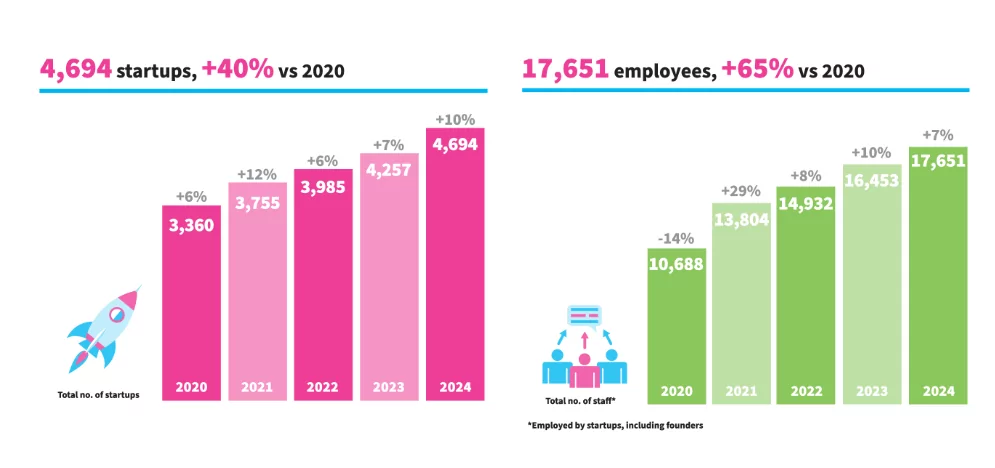Sourcing, e-commerce, physical reatailtech, these are the areas that Angelica Leung, head of consumer products for InvestHK, the government agency of the Hong Kong Special Administrative Region of China, is responsible for. She tells Startupbusiness how the city is now a hub for global trade and how logistics and distribution are using new technologies to address challenges that include not only increasing complexity but also changing consumer habits.
“Today in Hong Kong there are about 300,000 people employed in import-export activities alone,” says Leung (pictured), “there is a great ecosystem related to sourcing, a structure that supports the whole process and companies in the various activities, for example the adoption of what is needed to be compatible with European regulations, there is great attention to ESG issues, and there is investment attraction along with research, such as on new green materials. The government intends to strengthen Hong Kong’s position as a supply management hub, so all that is needed to flesh out this strategy: certification, logistics, we look a lot at material science and the use of AI for the supply chain because sourcing has changed, it is no longer limited to quality control but there is a lot more science and technology working with research centres, universities, companies.
For example, the Hong Kong Research Institute of Textiles and Apparel (HKRITA) was conceived as a research centre with an open lab approach where companies can develop new systems and technologies, e.g. today it is working on a process for separating cotton from the synthetic material of end-of-life products in order to use the resulting material to cultivate new cotton fields.
“Businesses are encouraged to work with these centres because they receive incentives from the government, which is looking with foresight to define models that are capable of being effective over time, for example today in Hong Kong there are more and more physical shops but there is a shortage of staff, so vendors are adopting technologies that are increasingly shifting operations to the consumer: payments, ordering, favouring online shopping, check out systems, pick up points, delivery lockers, are all components of a strategy that invites the consumer to be self-sufficient in managing the purchasing process. E-commerce is also undergoing a process of innovation, for example, new delivery vehicles have been developed that are equipped with three compartments with three different temperatures: sub-zero, cool, room temperature, in order to be able to allow the distribution of any type of product while optimising the logistical flow”, These vehicles were developed by HKTVmall which sells products online with home delivery and has six sorting centres distributed in five different locations which have been fully automated: “the thing you immediately notice when visiting one of these centres is that none of the employees move around the warehouse, everyone has their own station, what moves is only the goods”.
There are two points that Leung is keen to emphasise in order to illustrate why Hong Kong is an attractive opportunity for companies (as Charles Ng, also of InvestHK, had also illustrated in this interview): the role of Asia as a whole and the need to be increasingly inclusive towards all sections of the population.
“With InvestHK we develop long-term programmes and actions that aim to highlight the city’s opportunity as a pivot for the entire Asian region, programmes that are increasingly focused on specific sectors and needs that also look towards the development of research centres in areas such as lifescience and nanomaterials, Our role is to support companies that decide to come to Hong Kong in every aspect of the process, what is important is that you come and see what we do, come to Hong Kong and Asia to understand what the opportunities are and what the scenario is, often what transpires from the information is not enough to understand, so it is important to go to events, fairs, shows but not to spend all your time in the halls and stands but to go around and get to know the city.
Then there is the issue of the ageing population, which is predicted to be 30 per cent over 60 by 2039: ‘It is all very well to define proposals for consumers of the millennial and gen Z generations, but it must be considered that it will be the elderly who will carry more weight both numerically and in terms of purchasing power, We therefore need to work on increasingly inclusive products, on designs that are compatible with everyone’s needs, on labels that are not too small and difficult to read, we need a new approach that always makes consumers feel good and does not put them off with inappropriate design, and this too is on the front of research, of innovation set on long-term strategies’.

Innovation that naturally also concerns start-ups, which, according to the data in 2024 published by Startmeup.hk, choose Hong Kong as a destination for their expansion process: there are more than 4600 start-ups based in the city, employing almost 18,000 people and leveraging the services of 137 incubators, accelerators, co-working spacesOf those coming from abroad, 40.3 came from mainland China, 10.7% from the UK, 9% from the USA, 5.6% France, 4.2% Australia, 3.1% Canada, 3% Germany, India and Singapore, 2.2% Japan, the remaining 15.8% were distributed among all other countries.
ALL RIGHTS RESERVED ©
